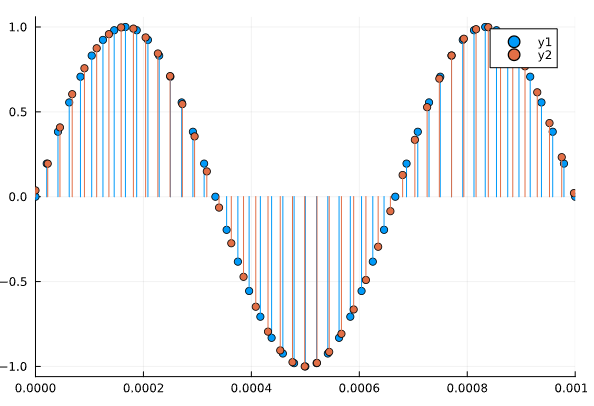Getting Started with Digital Signal Processing (DSP) in Engee
Working with functions
Loading and visualisation of the signal
The using function makes the listed modules available to the user, similar to the import function in other languages:
| Multiple outputs do not have to be bracketed as in MATLAB. |
using DSP, WAV, Plots
plotly()
s, fs = wavread("/user/test.wav")
plot(0:1/fs:(length(s)-1)/fs, s)Output
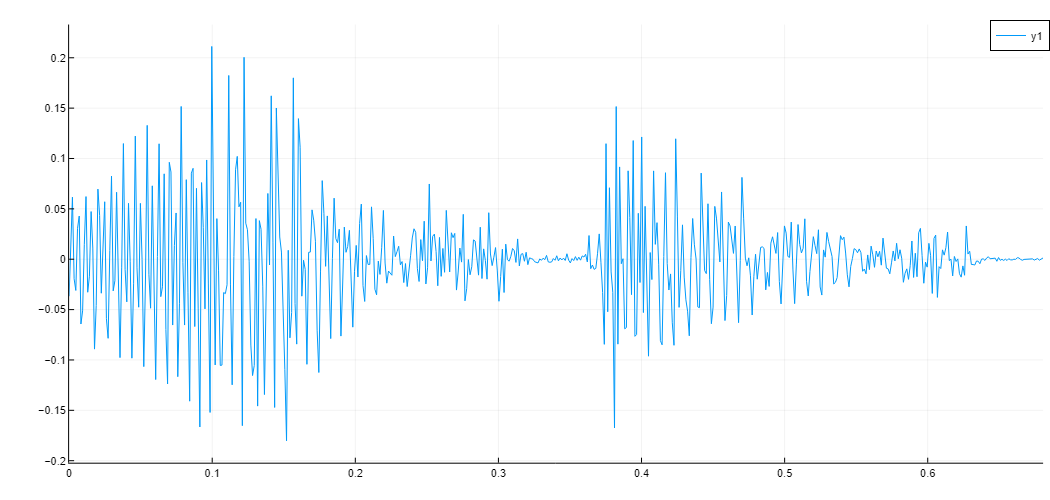
The function below takes a spectrogram with standard parameters for speech (Hanning windows 25 ms, overlap 10 ms), constructs and returns a spectrogram:
S = spectrogram(s[:,1], convert(Int, 25e-3*fs), convert(Int, 10e-3*fs); window=hanning)
Plots.heatmap(S.time.*1000, S.freq, pow2db.(S.power), xguide = "Time, ms", yguide = "Frequency, Hz")Output
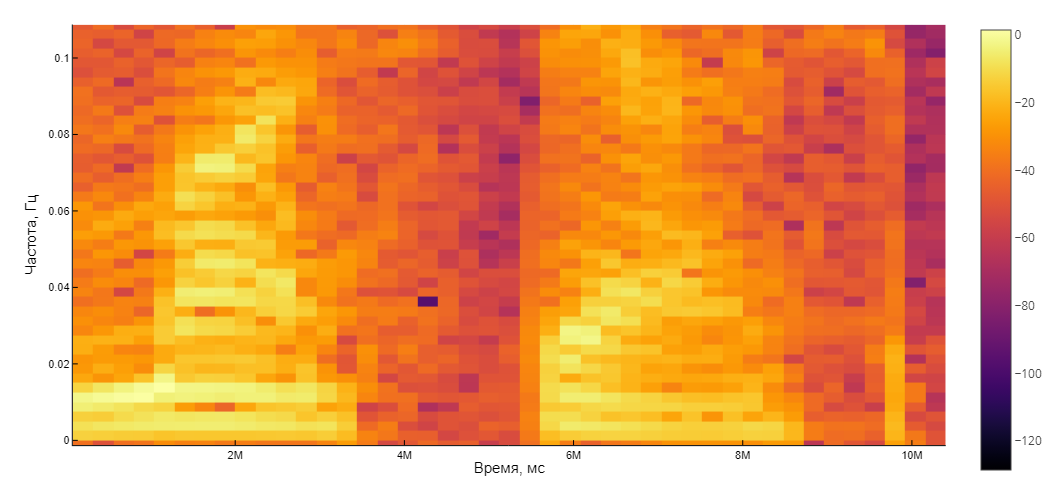
Signal processing
Now let’s pass the signal through a filter to simulate the phone’s bandwidth, and plot its spectrogram again:
responsetype = Bandpass(300, 3400; fs=fs)
prototype = Butterworth(8)
telephone_filter = digitalfilter(responsetype, prototype)Let’s look at the filter characteristic:
| Variables can have Unicode names. This is typed as \omega + tab. |
ω = 0:0.01:pi
H = freqz(telephone_filter, ω)Filter our signal:
sf = filt(telephone_filter, s)
Sf = spectrogram(s[:,1], convert(Int, 25e-3*fs), convert(Int, 10e-3*fs); window=hanning)
Plots.heatmap(Sf.time.*1000, Sf.freq, pow2db.(Sf.power), xguide = "Time, ms", yguide = "Frequency, Hz")Output
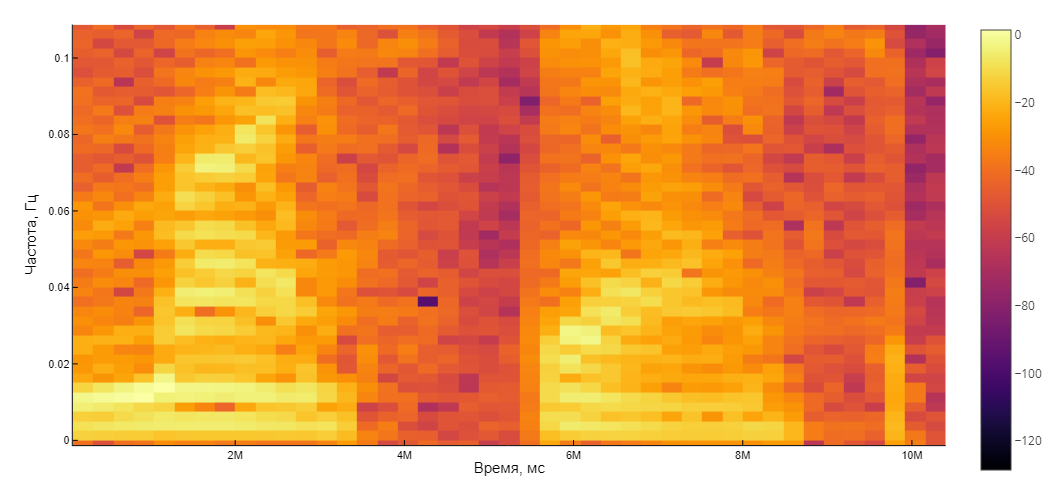
Reproduction of results
using Base64
function audioplayer(filepath)
markup = """<audio controls="controls" {autoplay}>
<source src="$filepath" />
Your browser does not support the audio element.
</audio>"""
display(MIME("text/html") ,markup)
end
function audioplayer(s, fs)
buf = IOBuffer()
wavwrite(s, buf; Fs=fs)
data = base64encode(unsafe_string(pointer(buf.data), buf.size))
markup = """<audio controls="controls" {autoplay}>
<source src="data:audio/wav;base64,$data" type="audio/wav" />
Your browser does not support the audio element.
</audio>"""
display(MIME("text/html") ,markup)
end
audioplayer(s, fs)
audioplayer(sf, fs)Output
Signal oversampling
In this example we will look at resampling an audio signal from 48kHz to 44.1kHz using a low pass filter design followed by resampling of the signal.
Let’s find the interpolation and decimation coefficients.
using Plots
using DSP
Fdat = 48e3;
Fcd = 44.1e3;
LM = Rational{Int32}(Fcd/Fdat);
L = LM.num;
M = LM.den;
(L,M)Output
(147, 160)
Visualise the original audio signal:
t = 0:1/Fdat:0.25-1/Fdat;
x = sin.(2*pi*1.5e3*t);
gr()
plot(t, x, line=:stem, marker=:circle)
xlims!((0,0.001))Output
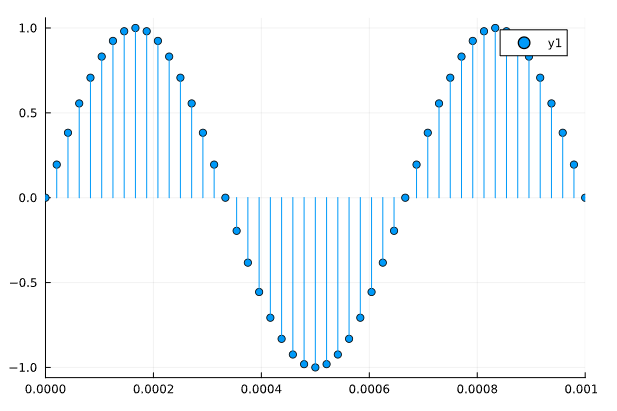
Let’s resample and overlay the obtained signal on the original one
f = (Fdat/2)*min(1/L,1/M)
win = DSP.Windows.kaiser(3579,3);
fir = DSP.Filters.digitalfilter(DSP.Filters.Lowpass(f/48e3),FIRWindow(win)).
xup = DSP.Filters.resample(x,Int64(L),fir);
y = L.*xup[1:M:end].
t_res = (0:(length(y)-1))/Fcd;
plot!(t_res, y, line=:stem, marker=:circle)Output
